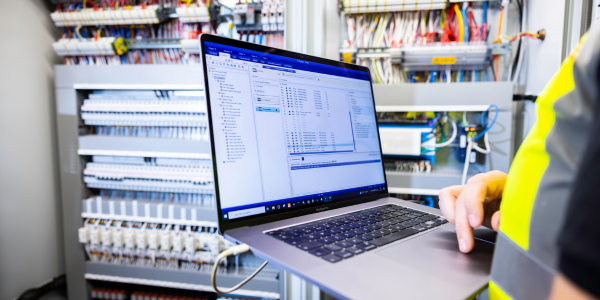In the world of business, there is a steady stream of new technology and software claiming it will revolutionise the way we work. But when it comes to managing a building, the right systems really can make life easier.
The way buildings are managed, maintained, and modified is being transformed by modern building management systems (BMS). A BMS provides valuable insight into complicated networks and finds new possibilities by evaluating the data from integrated building, technology, and energy systems. Doing so helps building managers make meaningful, realistic, and measurable improvements to operations and facilities management.
But, despite producing savings of as much as 30% on a single site’s energy bill, building management systems are still only present in around 15% of high-end buildings. Today, we’ll explore how a BMS can benefit your business, so you can see for yourself just what a great return on investment it can be.
How Does A Building Management System Work?
A Building Management System (BMS) is an edge computing system that manages and monitors equipment such as air conditioning, heating, ventilation, lighting, power systems, security devices, IoT sensors, and energy and gas metres in buildings.
Servers, supervisory devices, controllers, inputs, and outputs are all part of a traditional BMS.
A building management system links HVAC and other building equipment together, so they can act and be managed as a single unit and function harmoniously to prevent energy wastage. This should, ideally, consolidate processes and make data visualisation easy via a user interface or console.
The core functions of a BMS include:
Data Access & Analytics
Instead of long lists of alerts and metadata, a building management system with intelligent data analytics helps you focus on the big picture by offering easy, actionable results.
Specifically, analytics can provide the following benefits:
- Data on overall energy consumption is clear.
- Insights into building conditions, assets, and equipment in real-time.
Building management systems transform the way you manage each site, giving you access to prioritised information and avoiding a data overload.
Internal Systems That Are More Streamlined
Thanks to an interconnected network of building management and analytics technologies, it’s possible to continuously gather and analyse data from a wide variety of linked inputs. These might include:
- Sensors for indoor air quality, temperature & humidity
- Controls for the HVAC system
- Controls for lighting
- Sensors for occupancy
- Meters for water, gas, calorific energy and electricity
Increased Energy and Utility Savings
A BMS offers the opportunity to automate smart building management systems and energy efficiency programmes. This is usually a primary goal for building owners, since it can result in significant savings; according to some estimates, automating HVAC and lighting systems alone can reduce overall energy consumption by up to 30%.
Buildings become more energy-efficient, easier to manage and more valuable when they utilise the correct BMS technologies.
What Makes A Good Building Management System?
A good BMS will assist you in making more informed operational decisions and help to fine-tune your approach to facilities management. It will be energy efficient, reducing both your utility bill and your building’s footprint, and will be customisable to suit your needs.
By installing a bespoke building management system, you can ensure that it takes into account the way your site is used. A customised system may include automated lighting and security functionality or air quality monitoring tailored to different areas of your building. Whatever you need to maximise efficiency, usability and comfort in your building, the team at Cube Controls can build it.
Here are a few of the most beneficial features you can incorporate into a building management system:
Fault Detection & Diagnostics With Insight
System failures can lead to energy waste, unexpected downtime and, in many cases, hefty call-out bills from service contractors. A BMS with integrated analytics uses fault detection and diagnostics to reduce the likelihood of these occurrences by making the alarms you receive more helpful in solving problems. Prevent major breakdowns by identifying issues and tracking progress as you re-calibrate or re-strategise.
Automated Controls
A well designed & installed BMS can provide efficient, coordinated, and automatic responses based on user preferences by gathering relevant data from sensors. For example, when the platform learns the habits of inhabitants throughout your building or portfolio, it can adapt lighting conditions and change the temperature ahead of time based on anticipated users.
Whether you’re aiming to cut energy use, streamline internal processes, or improve the occupant experience, advanced building management system automation reduces the need for manual intervention and helps you accomplish your goals.
Comprehensive Reporting
A bespoke BMS can be designed to incorporate unified dashboards with easy-to-understand visualisations of clearly organised data. This could include extensive energy reporting, key performance indicator evaluations, occupancy statistics, and floor plan data, among other things. Data is evaluated and made visible in a way that is relevant to each audience, thanks to customisable reporting for all stakeholders.
User Interface for Mobile Devices
Get relevant, actionable insights from any computer or mobile device, wherever there’s a wifi connection, with an intuitive system tailored to match your needs. Connecting your BMS systems, controls and devices in a sophisticated web-accessible interface can transform operations and substantially enhance productivity, from repairing equipment to setting tailored temperature preferences.
At Cube Controls, we utilise IoT connectivity to create bespoke BMS networks for buildings of all sizes. Having instant access to BMS data allows businesses to increase technical staff efficiency, improve building occupant comfort, and reduce their energy and carbon footprint.
If you’d like to learn more about how a bespoke building management system could work for you, get in touch today.




